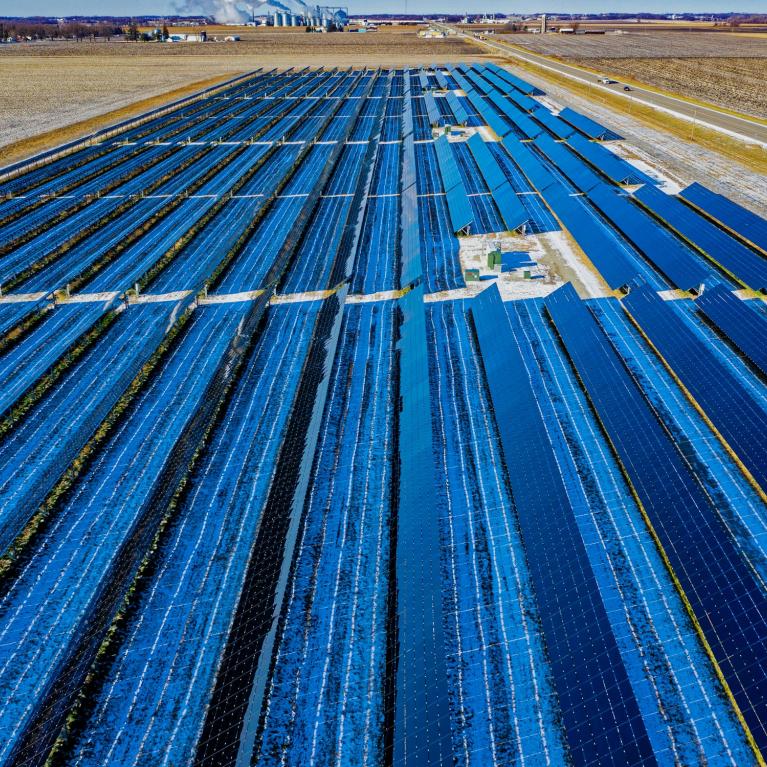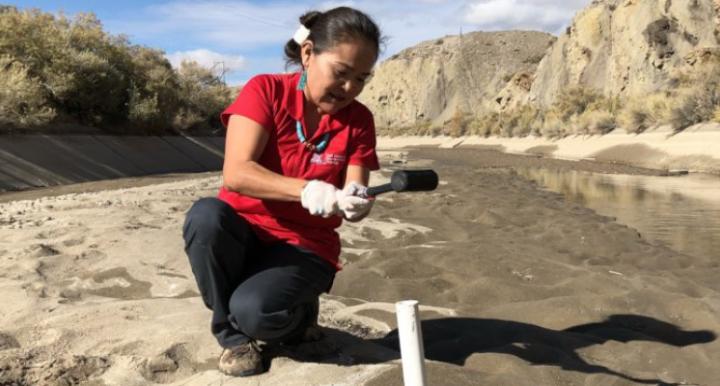Energy & Renewable Energy Systems
Arizona’s citizens are well positioned to receive energy from solar and wind, but challenged with increasing water scarcity. The University of Arizona is well positioned to pioneer alternative energy, energy/water (energy/food) technologies and systems, and new approaches to energy policy. This will help provide resilient, low-cost, low-carbon energy solutions.
UArizona provides cutting-edge research opportunities, cross-campus collaborations, and innovative partnerships that promote fresh ideas, technologies and effective solutions concerning energy systems. We promote the integration of renewable energy into the local and regional power grid through the Power Forecasting Group and energy storage research initiatives; develop novel materials for energy conversion, energy-efficient water use and intelligent building technologies; support regional testing and facilities; and study the societal and economic impacts of these advancements. Through partnerships, UArizona expands its breadth of social, scientific, economic and engineering capabilities to transfer knowledge from the laboratory to the field.
solar panel field.jpeg

Research Spotlights in Energy & Renewable Energy Systems
Neal Armstrong
Chemistry and Biochemistry
Armstrong’s research aims to improve scalability and lower the cost of energy conversion and light platforms through better understanding and control of composition, structure and energetics of the interfaces between electrical contacts and active layers for light emission.
Learn moreKim Ogden
Chemical and Biochemical Engineering
Ogden’s research focuses on bioreactor design for production of alternative fuels from algae and sweet sorghum.
Learn moreRoger Angel
Astronomy and Optical Sciences
Angel’s research team is developing concentrating photovoltaic systems for solar energy, using mirror modules that convert sunlight into electricity with twice the efficiency of conventional modules with silicon cells.
Learn moreGreg Barron-Gafford
School of Geography and Development & School of Natural Resources and the Environment
Barron-Gafford is developing agrivoltaic systems that co-locate agriculture and photovoltaic arrays to support the production of ecosystem services such as crop production, local climate regulation, water conservation and renewable energy production.
Learn more
(AIR) coordinates interdisciplinary groups of faculty, students and projects across the University of Arizona’s campus, from climate science to public policy, law, the arts, water resources and beyond. AIR explores and develops solutions with campus and community partners that will serve human and natural communities across the globe.
Read more
Biosphere 2 serves as a unique large-scale experimental apparatus housing seven model ecosystems with active research by teams of multidisciplinary scientists.
Read more
The vision of the Controlled Environment Agriculture Center is to develop controlled environment agriculture as an economically, environmentally, and socially sustainable agricultural option.
Read more
IES promotes and undertakes work to: more reliably integrate renewable energy into the grid; develop novel materials for energy conversion, energy-efficient water use and intelligent building technologies; support regional test beds and facilities and study the societal and economic impacts of technological advancements in energy.
Read more
The Office of Sustainability works to ensure that the UA continues to be a leader in sustainability among its peers. They collaborate with partners across the University and throughout the community to coordinate environmental sustainability initiatives and communication.
Read more
The UA RAFT testbed contains three 600-L open raceway growth systems and two larger scale raceway cultivation systems for small- and large-scale algae cultivation experiments, which include capabilities for low-heat solar-powered pumping, sumps to store cultures at night to conserve heat and increase winter productivity, and for harvesting biomass and recycling media.
Read more
The School of Sustainable Engineered Systems will be a leader in the improved design of linkages between our natural and engineered systems to sustainably provide material resources, water, energy, infrastructure, and manufactured products through innovative education, research, and outreach.
Read more
The SBAR Center of Excellence works to optimize and integrate the production of guayule and guar to enable the Southwest U.S. to significantly impact biofuel and other high-value product markets and to improve quality of life in rural communities and Native Nations.
Read more


